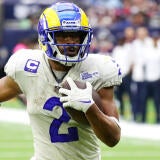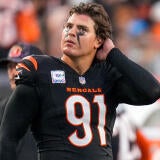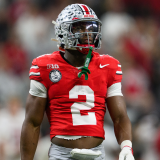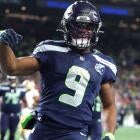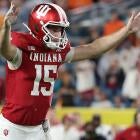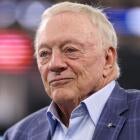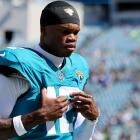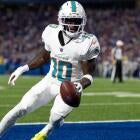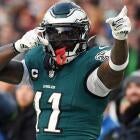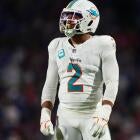Memo to Rams' fans: RG3 deal is helping your team, too
Apparently, there are some people in St. Louis who wish the Rams didn't make that trade that delivered RG3 to Washington. Well, be thankful they did because it's going to help your team for a long, long time.
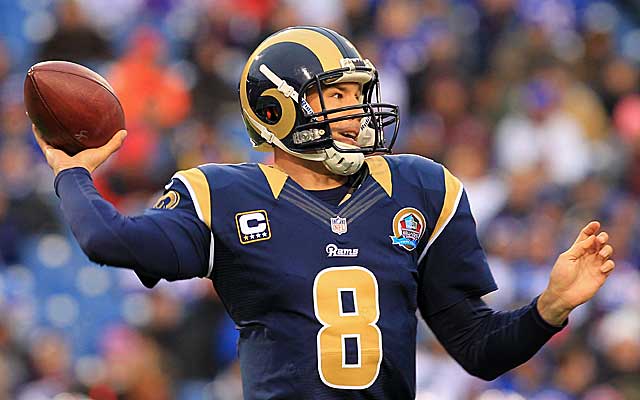 |
| Sam Bradford is the main reason the Rams traded the chance to draft RG3. (US Presswire) |
I was on a talk-radio station in St. Louis recently when the host notified me that some Rams fans weren't all that happy with the club's trade that sent Washington the second pick of the 2012 draft -- basically they wish St. Louis, not the Redskins, had Robert Griffin III.
I don't know about that, but I do know this: If I were the Rams, I'd make that deal again in a heartbeat.
Look, there's no question RG3 is one of the most dynamic and charismatic players to hit the NFL stage in some time. But St. Louis has a franchise quarterback, and I don't care if Sam Bradford is not as flashy or as fast as RG3; the guy's demonstrated he can be the foundation for the future.
| Related Info |
| Analysis |
 |
| More content |
Maybe that doesn't satisfy disgruntled people in St. Louis who'd rather have a quarterback that dazzles with the run as well as the pass, but it should. Bradford doesn't have the numbers or the nationwide following that RG3 does, but so what? When the two met earlier this year guess what happened?
Uh-huh, Bradford won.
Now let's get something straight: I'm not interested in getting into a comparison of who's better. I just want to tell you why, eight months after the deal was made, it looks just as good for St. Louis as it does Washington. The Redskins solidified the most important position on the field, where the Rams did that two years before. Given the chance to solidify their future, the Rams jumped -- gaining two additional first-round draft picks in 2013 and 2014, as well as a second-rounder this season -- and I call that smart.
"There is nothing wrong with a deal that helps both teams," said one source close to the Redskins.
Precisely. Which means the Rams made the right move. Here's why:
1. Sam Bradford
In case you forgot, one of the reasons coach Jeff Fisher chose St. Louis was the quarterback. He believes in Bradford, and he should. Two years ago, he was the league's Offensive Rookie of the Year, and, OK, so he regressed in 2011. So did his team, and that's generous. The Rams flat-out stunk. Bradford was in a different offensive system that didn't stress a quarterback's quick release, and he suffered behind an offensive line that changed players like most people change socks. Now Bradford is back -- with a new system, a new offensive line and a no lingering injuries -- and the results speak for themselves: He's on pace to produce more touchdowns, more yards wins and a higher passer rating than he did as a rookie.
Most importantly, he's winning again. The Rams are 6-6-1, with Bradford five times leading them from behind to fourth-quarter ties or victories -- and all this with his favorite receiver, Danny Amendola, in and out of the lineup.
You don't go far in today's NFL without a franchise quarterback, and the Rams found theirs with the first pick of the 2010 draft. So why would they flush him after only two seasons to exercise the second pick of the 2012 draft on the same position? Answer: They wouldn't. And they didn't.
"People who know quarterbacks think Sam Bradford's going to be a great one," said one NFC general manager. "Given that, St. Louis made a great trade."
2. Michael Brockers and Janoris Jenkins
Brockers, a defensive tackle, was the Rams' first pick in this year's draft; Jenkins, a cornerback, was their third. Each was taken with choices acquired in the deal with Washington (Brockers was taken after the Rams moved down again, picking up Dallas' choice), which means each becomes a footnote to history. But they're more than that, and if you've watched the Rams lately you know what I'm talking about. Both have been making plays -- and a lot of them -- during a three-game roll that has St. Louis at .500.
Brockers, the 14th pick of the draft, has been nothing short of sensational since returning from a high-ankle sprain that sidelined him the first three games. He had 11 tackles, including two for losses, in the Rams' overtime defeat of San Francisco. He has four sacks for the season. And he's a key reason why St. Louis was able to check the 49ers' Frank Gore to 58 yards rushing and a season-low 2.5 yards per carry two weeks ago and the Bills' C.J. Spiller and Fred Jackson to 61 combined yards rushing last weekend.
"He's a guy who could get consideration for Defensive Rookie of the Year," one GM said of Brockers.
Now look at Jenkins. Granted, he's been inconsistent this year, but lately he's made splash plays at critical times -- plays that include three returns for touchdowns. Jenkins is a starter on the league's 10th-ranked defense, and he should only improve. The same goes for Brockers, and don't measure the trade on these two guys alone ... because the Rams gained more than that. But what they have now is a good start.
"They are," said a general manager, "building blocks for what you can do in the future."
Exactly.
3. James Laurinaitis and Chris Long
Introducing two of the most important playmakers on the St. Louis defense. Laurinaitis leads the team in tackles; Long is second in sacks. Together they comprise the nucleus for a defense that shut down San Francisco two weeks ago, holding the 49ers to 13 points in five quarters. Granted, the Rams rank 19th there, but they're tied for second in sacks and vastly improved in recent weeks, surrendering an average of 14 points per game in their last three starts -- all victories.
But here's the point with these guys: With the cap room saved by not drafting a quarterback at the second spot, the Rams were able to sign Laurinaitis and Long to contract extensions and lock them down before they became unrestricted free agents -- important to remember when you consider that their best offensive player, Bradford, is signed through 2015.
I know, you can always be creative with cap space, but moving down in the draft gave St. Louis wiggle room and allowed them to keep their best players for years. Laurinaitis is under contract through 2017. Long's deal is through 2016. So is cornerback Cortland Finnegan's ... and defensive end Robert Quinn ... and defensive tackle Kendall Langford ... and Brockers. I think you get the idea. The Rams' best players aren't going anywhere for a long, long time.
4. The draft
I look at what the Rams gained from GM Les Snead's first draft, and I'd say St. Louis has someone who can and will add impact players in the future. If the 2013 draft were held today, St. Louis would hold the 16th and 20th picks, with the second the Redskins' choice. Obviously, that depends on where Washington finishes, but I don't care if it's lower or not. The Rams gain an extra first-round pick the Redskins don't have ... in either of the next two years.
"Essentially," one scout said, "they have a chance to get dramatically better the next two years where Washington does not."
That's critical for a club that is the league's youngest. The Rams are vastly improved over last year's 2-14 doormat but could use another offensive lineman, an elite wide receiver and a playmaker on defense -- and they'll have that opportunity.
An offensive line that went through four tackles this season has been better -- much better -- the past three weeks since Scott Wells returned to center and Robert Turner moved to left guard, and it doesn't take a genius to figure out what could happen if the Rams add one or two elite linemen.
But that's where Snead comes in. With this year's draft, he found immediate help in Brockers, Jenkins, wide receiver Chris Givens, kicker Greg Zuerlein, cornerback Trumaine Johnson and running back Daryl Richardson. And while wide receiver Brian Quick, a second-round pickup, has been a work in progress, the Rams believe that in time he'll come around and be a contributor.
That's another way of saying the Rams are rebuilding the right way ... with draft picks that stick. Snead rarely missed, and that’s encouraging for what's ahead. Because what's ahead are two drafts where St. Louis should have three of the top 50-55 picks in each of the next three years, and thank you, Washington. The trade that looked so good for both sides last spring still does.
"When we evaluated the trade," said the Rams' executive VP of football operations and COO Kevin Demoff, "we were looking at ways that would help us build a consistent winner over the next five to six years. We had a franchise quarterback in Sam Bradford and a quarterback who helped us attract a top-tier head coach, so we wanted to build our team around (him) -- and this trade definitely helps us do that. We just hope that when we look aback on this in 2017 we'll say it helped both of us."
I think you already can.

